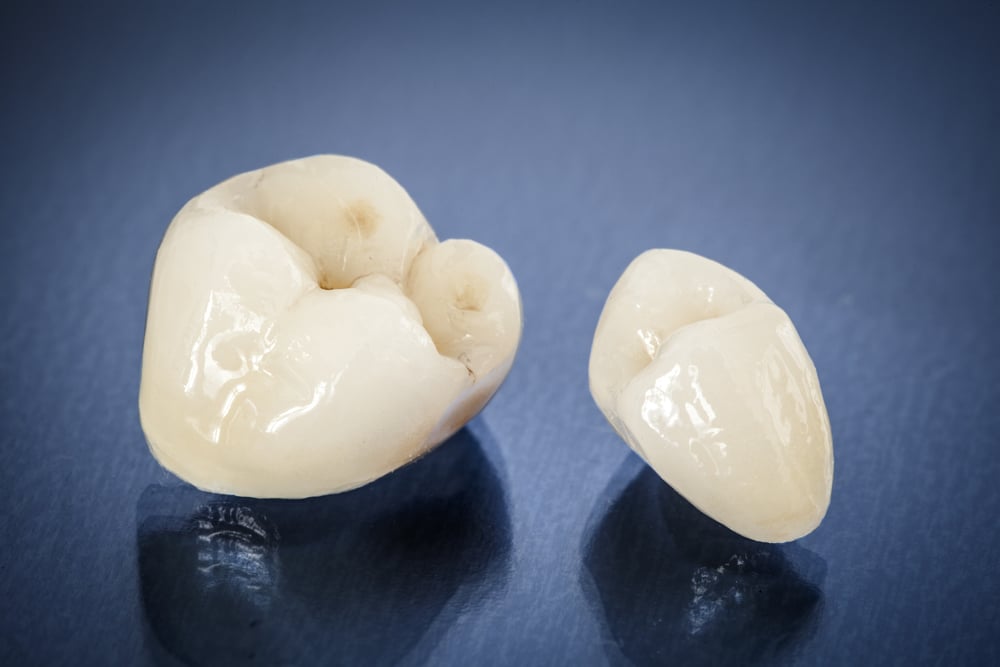Downtown Dental Excellence offers Dental Crowns in Cleveland, TX
If your tooth has been damaged, has suffered decay or simply doesn’t look as good as you would like it to look, the crown of the tooth may need to be replaced. When this is the case, a dental crown will likely need to be placed.
Choose Downtown Dental Excellence for your Dental Crown today.

What is a Dental Crown?
The “crown” of a tooth is the part of the tooth that can be seen over the gum line. A dental crown is a dental prosthetic that replaces a damaged crown. Dental crowns help to return the function of a damaged or decayed crown, allowing you to chew and bite properly. They also help to restore the appearance of a tooth that has suffered damage and no longer looks as aesthetically pleasing as it used to.
There are different materials that can be used to build the prosthetic that is placed where your natural crown used to be, including: metal, ceramic, porcelain and resin. Which option you go with depends on different factors, including appearance and cost.
Call Downtown Dental Excellence Today! (281) 592-0597
Do I Need a Dental Crown, Bonding, or Veneers?
While some cracks and other forms of damage will require an entire crown to be placed, other forms of damaged are less severe and may only need to be cared for in a way that improves the appearance of the tooth. When this is the case, dental bonding or placing a veneer may be an option.
Dental bonding utilizes a composite resin material that is bonded to the natural tooth, improving the strength of the tooth, while also improving the appearance of the tooth.
Veneers may involve removing a part of the tooth’s surface to place them, and then placing a porcelain piece on the original tooth. Unlike dental crowns, though, veneers do not replace the entire crown.
While all three are solid options for repairing a tooth, the amount of damage that has been sustained, and the amount of repair that is needed, will both be factors in which option your dentist decides to go with.
What is the Dental Crown Process?
Whether you notice the crown of a tooth being damaged—or your dentist does during a regular checkup—the tooth needs to be further inspected to understand the extent of the damage. Because of this, a dentist will take x-rays to see if the damage goes below the gum line. If not, your dentist may consider replacing the full crown.
Once the decision is made, the decay will be removed from the tooth. The tooth is then reshaped to improve the fit of the dental crown. This process should be relatively painless. From there, an impression of the tooth is made, and the impression is sent to a lab to be constructed. Once the prosthetic crown is completed, it will be sent back to your dentist. The construction will often take around two to three weeks.
Once the dental crown is ready, your dentist will install it. Anesthetic may be used during the placement. Your dentist will check to ensure that the dental crown fits properly, and looks the way it should. This may include the shape and the color. Once the dentist approves the dental crown, it will be secured with cement.
Call Downtown Dental Excellence Today! (281) 592-0597
Aftercare
Having a dental crown placed is no excuse to neglect your tooth, nor the teeth surrounding it. Remember that the tooth that has had the crown placed still has a natural root. It is important to clean your teeth and gums properly to avoid any bacteria or infection to the area around the newly placed dental crown. It is also important to care for your overall oral health, to avoid having any more crowns placed in the future. This includes brushing, flossing and rinsing out your mouth at least twice a day.
How Long do Crowns Last?
While the average crown lasts around five to fifteen years, they may last longer if they are properly cared for. Some crowns have made it as long as thirty years! The longevity of your crown will greatly depend on your oral care, and avoiding foods that may damage the dental crown.
Is My Crown Failing?
Crowns can fail, and it’s important to see a dentist as soon as this happens. Some things to look for are:
- Severe Pain
- Chips or Cracks
- Looseness
- Sensitivity While Biting or Chewing
Set an appointment with your dentist as soon as possible if you believe your crown is failing. A dental crown can help to restore the strength and appearance of a tooth that has been damaged or decayed. Speak with your dentist about having a dental crown placed if your crown is damaged.
